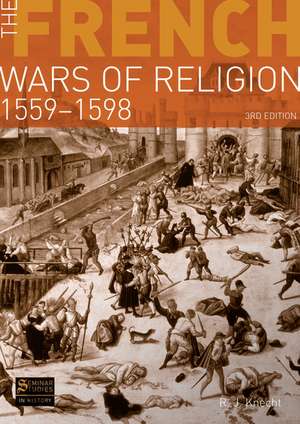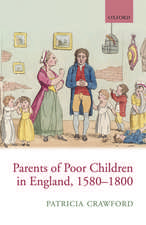The French Wars of Religion 1559-1598: Seminar Studies
Autor R. J. Knechten Limba Engleză Paperback – 10 iun 2010
In this lucid introduction to a complex period in French history, Robert Knecht:
- Explains the evangelical and Lutheran origins of the Huguenot Church in France
- Challenges simplistic interpretations of the religious conflict as purely a cloak for political rebellion
- Provides concise analysis of the wars themselves and the ferment of political ideas which they generated
- Evaluates the extent of France’s recovery under Henry IV
Each book in the Seminar Studies in History series provides a concise and reliable introduction to complex events and debates. Written by acknowledged experts and supported by extracts from historical Documents, a Chronology, Glossary, Who’s Who of key figures and Guide to Further Reading, Seminar Studies in History are the essential guides to understanding a topic.
Din seria Seminar Studies
-
 Preț: 305.61 lei
Preț: 305.61 lei -
 Preț: 378.25 lei
Preț: 378.25 lei -
 Preț: 193.64 lei
Preț: 193.64 lei -
 Preț: 314.19 lei
Preț: 314.19 lei -
 Preț: 211.76 lei
Preț: 211.76 lei -
 Preț: 308.30 lei
Preț: 308.30 lei -
 Preț: 307.26 lei
Preț: 307.26 lei -
 Preț: 307.80 lei
Preț: 307.80 lei -
 Preț: 306.00 lei
Preț: 306.00 lei -
 Preț: 309.39 lei
Preț: 309.39 lei -
 Preț: 309.39 lei
Preț: 309.39 lei -
 Preț: 333.63 lei
Preț: 333.63 lei -
 Preț: 305.63 lei
Preț: 305.63 lei -
 Preț: 306.35 lei
Preț: 306.35 lei -
 Preț: 309.48 lei
Preț: 309.48 lei -
 Preț: 307.74 lei
Preț: 307.74 lei -
 Preț: 308.52 lei
Preț: 308.52 lei -
 Preț: 307.27 lei
Preț: 307.27 lei -
 Preț: 299.85 lei
Preț: 299.85 lei -
 Preț: 306.00 lei
Preț: 306.00 lei -
 Preț: 306.94 lei
Preț: 306.94 lei -
 Preț: 314.42 lei
Preț: 314.42 lei -
 Preț: 394.66 lei
Preț: 394.66 lei -
 Preț: 306.65 lei
Preț: 306.65 lei -
 Preț: 346.51 lei
Preț: 346.51 lei -
 Preț: 310.45 lei
Preț: 310.45 lei -
 Preț: 306.00 lei
Preț: 306.00 lei -
 Preț: 306.39 lei
Preț: 306.39 lei -
 Preț: 306.39 lei
Preț: 306.39 lei -
 Preț: 332.75 lei
Preț: 332.75 lei -
 Preț: 306.06 lei
Preț: 306.06 lei -
 Preț: 304.42 lei
Preț: 304.42 lei -
 Preț: 317.38 lei
Preț: 317.38 lei -
 Preț: 332.21 lei
Preț: 332.21 lei -
 Preț: 306.29 lei
Preț: 306.29 lei -
 Preț: 308.52 lei
Preț: 308.52 lei -
 Preț: 203.98 lei
Preț: 203.98 lei -
 Preț: 307.93 lei
Preț: 307.93 lei -
 Preț: 306.59 lei
Preț: 306.59 lei -
 Preț: 414.36 lei
Preț: 414.36 lei -
 Preț: 316.55 lei
Preț: 316.55 lei -
 Preț: 330.10 lei
Preț: 330.10 lei -
 Preț: 266.29 lei
Preț: 266.29 lei -
 Preț: 305.47 lei
Preț: 305.47 lei -
 Preț: 348.97 lei
Preț: 348.97 lei -
 Preț: 308.91 lei
Preț: 308.91 lei -
 Preț: 308.03 lei
Preț: 308.03 lei -
 Preț: 307.93 lei
Preț: 307.93 lei -
 Preț: 306.65 lei
Preț: 306.65 lei -
 Preț: 305.90 lei
Preț: 305.90 lei
Preț: 239.33 lei
Preț vechi: 308.32 lei
-22% Nou
Puncte Express: 359
Preț estimativ în valută:
45.80€ • 47.94$ • 38.12£
45.80€ • 47.94$ • 38.12£
Carte tipărită la comandă
Livrare economică 31 martie-14 aprilie
Preluare comenzi: 021 569.72.76
Specificații
ISBN-13: 9781408228197
ISBN-10: 140822819X
Pagini: 208
Dimensiuni: 170 x 240 x 13 mm
Greutate: 0.36 kg
Ediția:3Revizuită
Editura: Taylor & Francis
Colecția Routledge
Seria Seminar Studies
Locul publicării:Oxford, United Kingdom
ISBN-10: 140822819X
Pagini: 208
Dimensiuni: 170 x 240 x 13 mm
Greutate: 0.36 kg
Ediția:3Revizuită
Editura: Taylor & Francis
Colecția Routledge
Seria Seminar Studies
Locul publicării:Oxford, United Kingdom
Cuprins
Preface to third edition
Note on referencing system
Acknowledgements
Chronology
Who’s Who
Glossary
Maps
PART ONE: ANALYSIS
INTRODUCTION
1. THE GROWTH OF CALVINISM
2. THE KINGDOM IN CRISIS
3. CATHERINE DE’ MEDICI AND THE COLLOQUY OF POISSY
4. THE FIRST THREE RELIGIOUS WARS
5. THE MASSACRE OF ST BARTHOLOMEW
6. HUGUENOT SURVIVAL AND RESISTANCE
7. HENRY III
8. ‘PARIS IS WORTH A MASS’: THE TRIUMPH OF HENRY IV
CONCLUSION
PART TWO: DOCUMENTS
1. The Tumult of Amboise, 1560
2. Michel de L’Hôpital: The Voice of Moderation, 13 December 1560.
3. The Colloquy of Poissy, 9 September-18 October 1561.
4. Monluc in Guyenne, 1562.
5. The situation in 1562: A Venetian view of France
6. Promises to avenge the murder of François, duke of Guise, 1563.
7. The St. Bartholomew’s Day Massacre, 1572.
8. The Huguenot State in the South, 1572.
9. Francogallia by François Hotman, 1573.
10. TheRight of Magistrates by Théodore De Bèze, 1574.
11. The Peace of Monsieur, 6 May 1576.
12. The Royal Mignons, July 1576.
13. The Defence of Liberty against Tyrants by Philippe Du Plessis-Mornay, 1579.
14. The Order of the Holy Ghost, January 1579.
15. The ‘Day of the Barricades’, 12 May, 1588.
16. The murder of Henri, Duke of Guise, at Blois, 23 December 1588.
17. The death of Catherine de’ Medici, 5 January 1589.
18. The assassination of Henry III, 1 August 1589.
19. An apologia for the Sixteen, 1593.
20. The Edict of Nantes, 13 April 1598.
21. Henry IV’s speech to the Parlement of Paris, 7 February 1599.
Genealogies
Index
Note on referencing system
Acknowledgements
Chronology
Who’s Who
Glossary
Maps
PART ONE: ANALYSIS
INTRODUCTION
1. THE GROWTH OF CALVINISM
2. THE KINGDOM IN CRISIS
3. CATHERINE DE’ MEDICI AND THE COLLOQUY OF POISSY
4. THE FIRST THREE RELIGIOUS WARS
5. THE MASSACRE OF ST BARTHOLOMEW
6. HUGUENOT SURVIVAL AND RESISTANCE
7. HENRY III
8. ‘PARIS IS WORTH A MASS’: THE TRIUMPH OF HENRY IV
CONCLUSION
PART TWO: DOCUMENTS
1. The Tumult of Amboise, 1560
2. Michel de L’Hôpital: The Voice of Moderation, 13 December 1560.
3. The Colloquy of Poissy, 9 September-18 October 1561.
4. Monluc in Guyenne, 1562.
5. The situation in 1562: A Venetian view of France
6. Promises to avenge the murder of François, duke of Guise, 1563.
7. The St. Bartholomew’s Day Massacre, 1572.
8. The Huguenot State in the South, 1572.
9. Francogallia by François Hotman, 1573.
10. TheRight of Magistrates by Théodore De Bèze, 1574.
11. The Peace of Monsieur, 6 May 1576.
12. The Royal Mignons, July 1576.
13. The Defence of Liberty against Tyrants by Philippe Du Plessis-Mornay, 1579.
14. The Order of the Holy Ghost, January 1579.
15. The ‘Day of the Barricades’, 12 May, 1588.
16. The murder of Henri, Duke of Guise, at Blois, 23 December 1588.
17. The death of Catherine de’ Medici, 5 January 1589.
18. The assassination of Henry III, 1 August 1589.
19. An apologia for the Sixteen, 1593.
20. The Edict of Nantes, 13 April 1598.
21. Henry IV’s speech to the Parlement of Paris, 7 February 1599.
Genealogies
Index
Notă biografică
R. J. Knecht is Emeritus Professor of French history, University of Birmingham.
Descriere
This Seminar Study provides the reader with a lucid introduction to a complex period of French history. In the second half of the sixteenth century France was racked by religious civil wars and peace was only restored when Henry of Navarre finally converted to Catholicism, deciding - in his immortal phrase - that 'Paris is worth a mass'.
Professor Knecht begins his study by explaining how the Huguenot Church grew out of the evangelicalism of the early sixteenth century and of the failure of Francis I to check the influx of Lutheranism. He goes on to show how the rivalry between leading noble houses developed into political and religious conflict, challenging the assumption that religion was used merely as a cloak for rebellion. He provides a succinct analysis of the wars themselves and considers the ferment of political ideas which they generated. The subject is set in its widest context as the author looks at the effect which the wars had on the French state, economy and society and the author concludes his study by evaluating the extent of France's recovery under Henry IV.
Professor Knecht begins his study by explaining how the Huguenot Church grew out of the evangelicalism of the early sixteenth century and of the failure of Francis I to check the influx of Lutheranism. He goes on to show how the rivalry between leading noble houses developed into political and religious conflict, challenging the assumption that religion was used merely as a cloak for rebellion. He provides a succinct analysis of the wars themselves and considers the ferment of political ideas which they generated. The subject is set in its widest context as the author looks at the effect which the wars had on the French state, economy and society and the author concludes his study by evaluating the extent of France's recovery under Henry IV.













